- Home
- Francine Rivers
A Voice in the Wind Page 2
A Voice in the Wind Read online
Page 2
Grabbing and shaking her mother, Hadassah had pleaded, “You can’t let him go! Not this time!”
“Be silent, Hadassah. Who are you serving by arguing so against your father?”
Her mother’s reprimand, though spoken gently, had struck hard. She had said many times before that when one did not serve the Lord, they unwittingly served the evil one instead. Fighting tears, Hadassah had obeyed and said no more.
Rebekkah had laid her hand against her husband’s gray-bearded face. She had known Hadassah was right; he might not return, probably wouldn’t. Yet, perhaps, if it was God’s will, one soul might be saved through his sacrifice. One might be enough. Her eyes had been full of tears and she could not—dared not—speak. For if she had, she was afraid she would join Hadassah in pleading that he stay safe in this small house. And Hananiah knew better than she what the Lord willed for him. He had placed his hand over hers and she had tried not to weep.
“Remember the Lord, Rebekkah,” he had said solemnly. “We are together in him.”
He had not returned.
Hadassah leaned down over her mother protectively, afraid she would lose her, too. “Mother?” Still no response. Her breathing was shallow, her color ashen. What was taking Mark so long? He had been gone since dawn. Surely the Lord would not take him as well. . . .
In the silence of the small room, Hadassah’s fear grew. She stroked her mother’s hair absently. Please, God. Please! Words wouldn’t come, at least not any that made sense. Just a groaning from within her soul. Please what? Kill them now with starvation before the Romans came with swords or they suffered the agony of a cross? Oh, God, God! Her plea came, inarticulate and desperate, helpless and full of fear. Help us!
Why had they ever come to this city? She hated Jerusalem.
Hadassah fought against the despair inside her. It had become so heavy, it felt like a physical weight pulling her into a dark pit. She tried to think of better times, of happier moments, but those thoughts wouldn’t come.
She thought of the months long ago when they’d made the journey from Galilee, never expecting to be trapped in the city. The night before they had entered Jerusalem, her father set up camp on a hillside within sight of Mount Moriah, where Abraham had almost sacrificed Isaac. He told them stories of when he was a boy living just outside the great city, speaking far into the night of the laws of Moses, under which he had grown up. He spoke of the prophets. He spoke of Yeshua, the Christ.
Hadassah had slept and dreamt of the Lord feeding the five thousand on a hillside.
She remembered that her father had awakened the family at dawn. And she remembered how, as the sun rose, light had reflected off the marble and gold of the temple, turning the structure into a blazing beacon of fiery splendor that could be seen from miles away. Hadassah could still feel the awe she had felt at the glory of it. “Oh, Father, it is so beautiful.”
“Yes,” he had said solemnly. “But so often, things of great beauty are full of great corruption.”
Despite the persecution and danger that had awaited them in Jerusalem, her father had been full of joy and expectation as they entered the gates. Perhaps this time more of his kinsmen would listen; more would give their hearts to the risen Lord.
Few believers of the Way remained in Jerusalem. Many had been imprisoned, some stoned, even more driven away to other places. Lazarus, his sisters, and Mary Magdalene had been driven out; the apostle John, a dear family friend, had left Jerusalem two years before, taking the Lord’s mother with him. Yet, Hadassah’s father had remained. Once a year, he had returned to Jerusalem with his family to gather with other believers in an upper room. There they shared bread and wine, just as their Lord Jesus had done the evening before his crucifixion. This year, Shimeon Bar-Adonijah had presented the elements of the Passover meal:
“The lamb, the unleavened bread, and the bitter herbs of the Passover have as much meaning for us as for our Jewish brothers and sisters. The Lord fulfills each element. He is the perfect Lamb of God who, though without sin himself, has taken the bitterness of our sins upon him. Just as the captive Jews in Egypt were told to put the blood of a lamb on their door so that God’s wrath and judgment would pass over them, so Jesus has shed his blood for us so that we will stand blameless before God in the coming Judgment Day. We are the sons and daughters of Abraham, for it is by our faith in the Lord that we are saved through his grace. . . .”
For the following three days they had fasted and prayed and repeated Jesus’ teachings. On the third day, they sang and rejoiced, breaking bread together once more in celebration of Jesus’ resurrection. And every year, during the last hour of the gathering, her father would tell his own story. This year had been no different. Most had heard his story many times before, but there were always those who were new to the faith. It was to these people that her father spoke.
He stood, a simple man with gray hair and beard, and dark eyes full of light and serenity. There was nothing remarkable about him. Even as he spoke, he was ordinary. It was the touch of God’s hand that made him different from others.
“My father was a good man, a Benjaminite who loved God and taught me the law of Moses,” he began quietly, looking into the eyes of those who sat about him. “He was a merchant near Jerusalem and married my mother, the daughter of a poor husbandman. We were not rich and we were not poor. For all we had, my father gave glory and thanks to God.
“When the Passover came, we closed our small shop and entered the city. Mother stayed with friends and prepared for the Passover. My father and I spent our time at the temple. To hear God’s Word was to eat meat, and I dreamed of being a scribe. But it would not come to pass. When I was fourteen, my father died and, with no brothers and sisters, it was necessary for me to take over his business. Times were very hard, and I was young and inexperienced, but God was good. He provided.”
He closed his eyes. “Then a fever took hold of me. I struggled against death. I could hear my mother weeping and crying out to God. Lord, I prayed, don’t let me die. My mother needs me. Without me, she is alone, with no one to provide for her. Please do not take me now! But death came. It surrounded me like a cold darkness and took hold of me.” The hush in the room was almost tangible as his listeners awaited the ending.
No matter how many times Hadassah had heard the story, she never tired of it nor lost the power of it. As her father spoke, she could feel the dark and lonely force that had claimed him. Chilled, she wrapped her arms around her legs and hugged them against her chest as he went on.
“My mother said friends were carrying me along the road to my tomb when Jesus passed by. The Lord heard her weeping and took pity. My mother didn’t know who he was when he stopped the funeral procession, but there were many with him, followers, as well as the sick and crippled. Then she recognized him, for he touched me and I arose.”
Hadassah wanted to leap up and cry out in joy. Some of those around her wept, their faces transfixed with wonder and awe. Others wanted to touch her father, to lay hands on a man who had been brought back from death by Christ Jesus. And they had so many questions. How did you feel when you arose? Did you speak with him? What did he say to you? What did he look like?
In the upper room, with the gathering of believers, Hadassah had felt safe. She had felt strength. In that place, she could feel the presence of God and his love. “He touched me and I arose.” God’s power could overcome anything.
Then they would leave the upper room and, as her father walked the family back to the small house where they stayed, Hadassah’s ever-present fear would rise again. She always prayed her father wouldn’t stop and speak. When he told his story to believers, they wept and rejoiced. To unbelievers, he was an object of ridicule. The euphoria and security she felt with those who shared her faith dissolved when she watched her father stand before a crowd and suffer their abuse.
“Listen to me, O men of Judah!” he would call out, drawing people to him. “Listen to the good news I have to tell you.”
Two years ago he had been so badly beaten that two friends had to help carry him back to the small rented house where they always stayed. Elkanah and Benaiah had tried to reason with him.
“Hananiah, you must not come back here,” Elkanah had said. “The priests know who you are and want you silenced. They are not so foolish as to have a trial, but there are many evil men who will do another’s will for a shekel. Shake the dust of Jerusalem from your shoes and go somewhere that the message will be heard.”
“And where else can that be but here where our Lord died and arose?”
“Many of those who witnessed his resurrection have fled imprisonment and death at the hands of the Pharisees,” Benaiah had said. “Even Lazarus has left Judea.”
“Where did he go?”
“I was told he took his sisters and Mary of Magdala to Gaul.”
“I cannot leave Judea. Whatever happens, this is where the Lord wants me.”
Benaiah had grown silent for a long moment and then he nodded slowly. “Then it shall be as the Lord wills it.”
Elkanah had agreed and laid his hand on her father’s. “Shelemoth and Cyrus are remaining here. They will give you aid when you are in Jerusalem. I am taking my family away from this city. Benaiah is coming with me. May God’s face shine upon you, Hananiah. You and Rebekkah will be in our prayers. And your children, too.”
Hadassah had wept, her hopes of leaving this wretched city dashed. Her faith was weak. Her father always forgave his tormenters and attackers, while she prayed they would know all the fires of hell for what they had done to him. She often prayed that God would change his will and send her father to a place other than Jerusalem. Someplace small and peaceful where people would listen.
“Hadassah, we know that God uses all things for good to those who love him, to those who are called according to his purpose,” her mother said often, trying to comfort her.
“What good is there in a beating? What good in being spit upon? Why must he suffer so?”
In the peaceful hills of Galilee, with the blue sea stretched out before her and lilies of the field at her back, Hadassah could believe in God’s love. At home, in those hills, her faith was strong. It warmed her and made her heart sing.
In Jerusalem, though, she struggled. She clung to her faith, but still found it slipping away from her. Doubt was her companion, fear was overwhelming.
“Father, why can we not believe and remain silent?”
“We are called upon to be the light of the world.”
“They hate us more with each passing year.”
“Hatred is the enemy, Hadassah. Not the people.”
“It is people who beat you, Father. Did not the Lord himself tell us not to cast pearls before the swine?”
“Hadassah, if I am to die for him, I will die joyfully. What I do is for his good purpose. The truth does not go out and come back empty. You must have faith, Hadassah. Remember the promise. We are part of the body of Christ, and in Christ we have eternal life. Nothing can separate us. No power on earth. Not even death.”
She had pressed her face against his chest, the rough woven tunic he wore rubbing against her skin. “Why can I believe at home, Father, but not here?”
“Because the enemy knows where you are most vulnerable.” He had put his hand over hers. “Do you remember the story of Jehoshaphat? The sons of Moab and Ammon and Mount Seir came against him with a mighty army. The Spirit of the Lord came upon Jahaziel and God said through him, ‘Do not be afraid nor dismayed because of this great multitude, for the battle is not yours, but God’s.’ While they sang and praised the Lord, the Lord himself set ambushes against their enemies. And in the morning, when the Israelites came to the lookout of the wilderness, they saw the bodies of the dead. No one escaped. The Israelites had not even raised a hand in battle, and the battle was won.”
Kissing her head, he had said, “Stand firm in the Lord, Hadassah. Stand firm and let him fight your battles. Do not try to fight alone.”
Hadassah sighed, trying to ignore the burning in her stomach. How she missed her father’s counsel in the silent loneliness of this house. If she believed everything he had taught her, she would rejoice that he was now with the Lord. Instead she ached with grief, which swelled and spilled over her in waves, spreading with it a strange, confused anger.
Why did her father have to be such a fool for Christ? The people didn’t want to hear; they didn’t believe. His testimony offended them. His words drove them mad with hatred. Why couldn’t he, just once, have remained silent and stayed within the safe confines of this small house? He’d still be alive, here in this room, comforting them and giving them hope instead of leaving them to fend for themselves. Why couldn’t he have been sensible this one time and waited out the storm?
The door opened slowly and Hadassah’s heart leapt in fright, snapping her back to the grim present. Robbers had broken into the houses down the street, murdering the occupants for a loaf of hoarded bread. But it was Mark who entered. She let out her breath, relieved to see him. “I was so afraid for you,” she whispered with feeling. “You’ve been gone for hours.”
He pushed the door closed and sank down, exhausted, against the wall near their sister. “What did you find?” She waited for him to take whatever he had found from his shirt. Whatever food was found had to be secreted or someone would attack him for it.
Mark looked at her hopelessly. “Nothing. Nothing at all. Not a worn shoe, not even shield leather from a dead soldier. Nothing.” He started to cry, his shoulders shaking.
“Shhh, you’ll awaken Leah and Mama.” Hadassah gently laid her mother back against the blanket and went to him. She put her arms around him and leaned her head against his chest. “You tried, Mark. I know you tried.”
“Maybe it’s God’s will that we die.”
“I’m not sure I want to know God’s will anymore,” she said without thinking. Quick tears came. “Mama said the Lord will provide,” she said, but the words sounded empty. Her faith was so weak. She was not like Father and Mother. Even Leah, young as she was, loved the Lord wholeheartedly. And Mark sounded so accepting of death. Why was she always the one who questioned and doubted?
Have faith. Have faith. When you have nothing else, have faith.
Mark shuddered, drawing her out of her gloomy thoughts. “They are throwing bodies into the Wadi El Rabadi behind the holy temple. Thousands, Hadassah.”
Hadassah remembered the horror of the Valley of Hinnom. It was there that Jerusalem disposed of the dead and unclean animals and dumped the night soil. Baskets of hooves, entrails, and animal remains from the temple were carried there and dumped. Rats and carrion birds infested the place, and the stench frequently was carried in hot winds across the city. Father called it Gehenna. “It was not far from here that our Lord was crucified.”
Mark pushed his hand back through his hair. “I was afraid to go closer.”
Hadassah shut her eyes tightly, but the question rose stark and raw against her will. Had her father been cast into that place, desecrated and left to rot in the hot sun? She bit her lip and tried to force the thought away.
“I saw Titus,” Mark said dully. “He rode over with some of his men. When he saw the bodies, he cried out. I could not hear his words, but a man said he was calling out to Jehovah that it was not his doing.”
“If the city surrendered now, would he show mercy?”
“If he could contain his men. They hate the Jews and want to see them destroyed.”
“And us along with them.” She shivered. “They will not know the difference between believers of the Way and zealots, will they? Seditionist or righ
teous Jew or even Christian, it will make no difference.” Her eyes blurred with tears. “Is this the will of God, Mark?”
“Father said it is not God’s will that any should suffer.”
“Then why must we?”
“We bear the consequences for what we have done to ourselves, and for the sin that rules this world. Jesus forgave the thief, but he didn’t take him down off the cross.” He pushed his hand back through his hair. “I’m not wise like Father. I haven’t any answers to why, but I know there is hope.”
“What hope, Mark? What hope is there?”
“God always leaves a remnant.”
The siege wore on, and while life within Jerusalem ebbed, the spirit of Jewish resistance did not. Hadassah remained within the small house, hearing the horror of what was just beyond their unbolted door. A man was screaming and running down the street. “They’ve ascended the wall!”
When Mark went out to find out what was happening, Leah became hysterical. Hadassah went to her sister and held her tightly. She felt near to hysteria herself, but tending her young sister helped calm her.
“Everything will be all right, Leah. Be still.” Her words sounded meaningless in her own ears. “The Lord is watching over us,” she said and stroked her sister gently.
A litany of comforting lies, for the world was crumbling around them. Hadassah looked across the room at her mother and felt the tears coming again. Her mother smiled weakly as though trying to reassure her, but she felt no reassurance. What would become of them?
When Mark returned, he told them of the battle raging within the walls. The Jews had turned it and were driving the Romans back.
However, that night, under the cover of darkness, ten legionnaires sneaked through the ruins of the city and took possession of Antonia Tower. The battle had come to the very entrance of the holy temple. Though driven back again, the Romans countered by overthrowing some of the foundations of the tower and laid open the court of the Gentiles. In an attempt to divert them, zealots attacked the Romans at the Mount of Olives. Failing, they were destroyed. The prisoners taken were crucified before the walls for all to see.

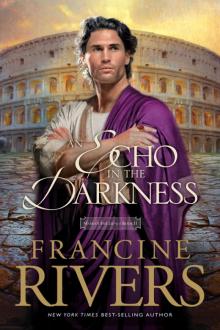 An Echo in the Darkness
An Echo in the Darkness A Lineage of Grace
A Lineage of Grace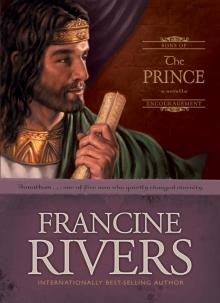 The Prince: Jonathan
The Prince: Jonathan Bridge to Haven
Bridge to Haven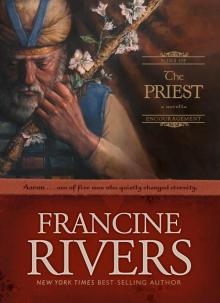 The Priest: Aaron
The Priest: Aaron Her Mother's Hope
Her Mother's Hope Redeeming Love
Redeeming Love The Scarlet Thread
The Scarlet Thread The Masterpiece
The Masterpiece The Last Sin Eater
The Last Sin Eater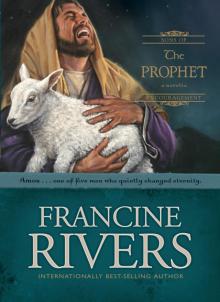 The Prophet: Amos
The Prophet: Amos As Sure as the Dawn
As Sure as the Dawn Her Daughter's Dream
Her Daughter's Dream A Voice in the Wind
A Voice in the Wind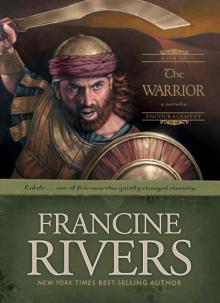 The Warrior: Caleb
The Warrior: Caleb The Scribe: Silas
The Scribe: Silas And the Shofar Blew
And the Shofar Blew The Atonement Child
The Atonement Child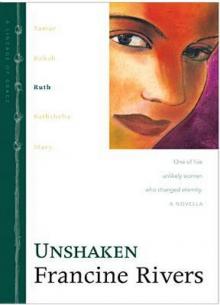 Unshaken_Ruth
Unshaken_Ruth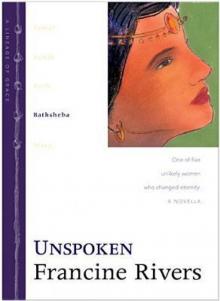 Unspoken_Bathsheba
Unspoken_Bathsheba The Scribe
The Scribe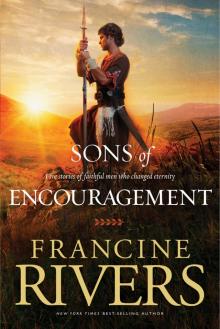 Sons of Encouragement
Sons of Encouragement The Shoe Box
The Shoe Box Sycamore Hill
Sycamore Hill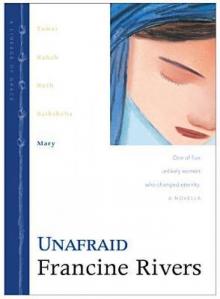 Unafraid_Mary
Unafraid_Mary Marta's Legacy Collection
Marta's Legacy Collection